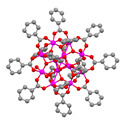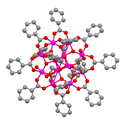Appreciate the imperfections
When a crystalline material is being developed for large-scale applications, the question arises: what if the material isn’t a perfect crystal? This is a particularly relevant issue for crystals of molecular magnets—molecules that carry a large spin—as they have been touted as potential quantum information storage systems.
In a paper appearing in Physical Review B, Chiara Carbonera and colleagues at the Instituto de Ciencia de Materiales de Aragón (CSIC-U. Zaragoza) in Spain, in collaboration with scientists at several institutions in Europe, present a careful study of the role of disorder on quantum tunneling in single-molecule magnet crystals. Quantum tunneling is the field-induced tunneling of molecular spins from one quantum state to the other, a process that could provide a way of storing information in the crystal.
Carbonera et al. focus on a crystal of benzoate, which is one of the most widely studied of the molecular magnets. The group took care to prepare their crystals without solvent molecules, known as a source of local disorder. This allows them to compare two extreme situations: a highly crystalline structure, and one that is rapidly cooled to yield long-range disorder.
Carbonera et al. combine several complimentary experimental techniques—magnetic susceptibility, electron-spin resonance, neutron scattering—to reveal that, contrary to expectation, crystalline disorder has only minimal effect on quantum tunneling. In fact, disorder appears to make the spins tunnel faster than they would have in a perfect crystal, which is good news should these materials turn out to be a viable system for quantum information processing. – Jessica Thomas





